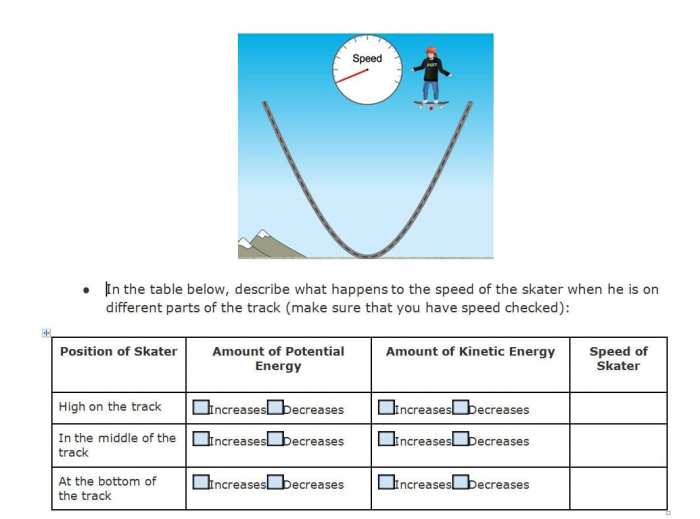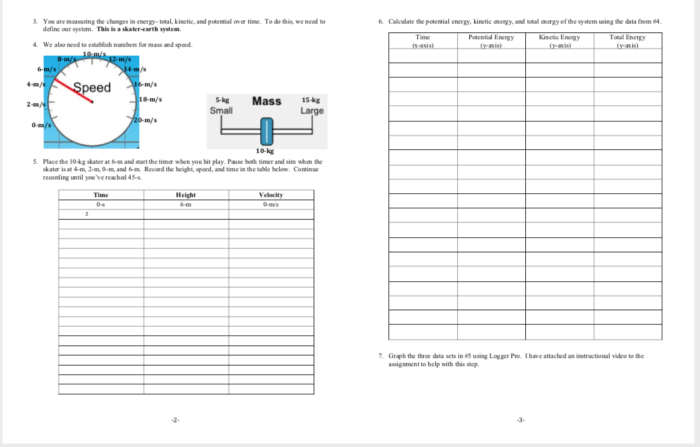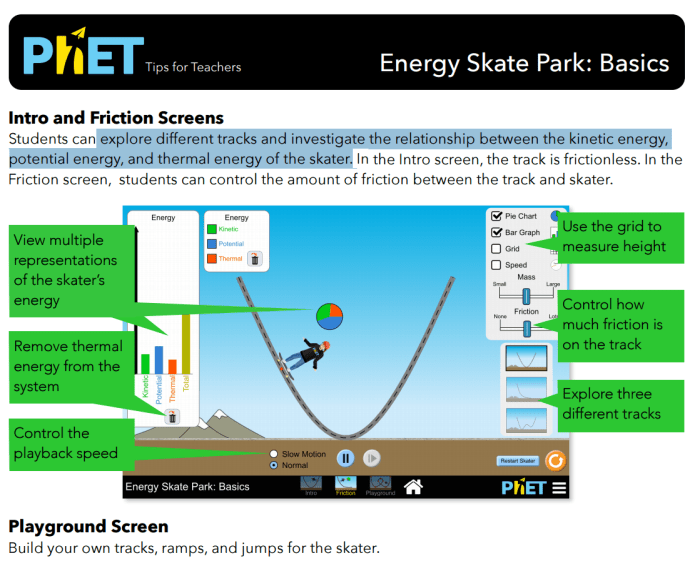Dive into the electrifying world of Energy Skate Park Lab Answers, where the exhilarating sport of skateboarding transforms into a captivating educational experience. Prepare to witness the seamless fusion of energy principles and the adrenaline rush of skateboarding, as we explore the secrets of this innovative learning environment.
At Energy Skate Park Lab, skateboarding is not just a recreational activity; it’s a scientific playground where students harness the power of motion to unravel the complexities of energy. From the moment you step into the lab, you’ll embark on an extraordinary journey of discovery, unlocking the mysteries of energy transfer, conservation, and transformation.
Introduction to Energy Skate Park Lab

Energy Skate Park Lab is an interactive, educational space designed to teach visitors about the principles of energy and its applications in everyday life. It is a unique and engaging learning environment that combines hands-on activities, interactive exhibits, and educational programs to create a fun and informative experience for all ages.
The lab features a variety of exhibits that demonstrate the different forms of energy, including kinetic, potential, thermal, electrical, and chemical energy. Visitors can learn about the laws of thermodynamics, the principles of energy conservation, and the applications of energy in various technologies and systems.
Key Features and Offerings
- Interactive exhibits that allow visitors to explore the principles of energy through hands-on activities.
- Educational programs and workshops that provide in-depth learning experiences on energy-related topics.
- A dedicated space for research and development of new energy technologies and applications.
- A team of experts and educators who are passionate about sharing their knowledge and inspiring the next generation of energy leaders.
Exploring Energy Concepts through Skateboarding
Skateboarding provides a dynamic platform to explore fundamental energy principles. The act of skateboarding involves various forms of energy transformations, demonstrating the interplay between potential, kinetic, and mechanical energy. The lab ingeniously utilizes skateboarding as a teaching tool, enabling students to witness these energy principles in action.
Forms of Energy Involved in Skateboarding
During skateboarding, potential energy stored in the skateboarder’s body and the skateboard is converted into kinetic energy as they move down a ramp. The kinetic energy is then transformed into mechanical energy as the skateboarder maneuvers through the obstacles and executes tricks.
Diving into the intricacies of energy skate park lab answers, one may stumble upon parallels in the poignant narrative of To Kill a Mockingbird . Just as the novel explores the complexities of justice and prejudice, so too do these lab answers delve into the intricacies of energy conservation and sustainability.
Returning to our initial inquiry, we find that energy skate park lab answers offer a treasure trove of insights, providing a solid foundation for understanding the principles that govern our world.
This continuous conversion of energy forms provides a tangible representation of energy principles.
Lab Activities for Teaching Energy Concepts
The lab incorporates skateboarding into various activities to illustrate energy concepts. One activity involves measuring the speed of a skateboarder at different points on a ramp. This activity demonstrates the relationship between potential and kinetic energy, as the skateboarder’s speed increases with height.
Another activity involves analyzing the trajectory of a skateboard after it is launched from a ramp. This activity helps students understand the conservation of energy, as the skateboard’s height and velocity are interconnected.
Experimental Design and Data Analysis: Energy Skate Park Lab Answers

Energy Skate Park Lab utilizes a meticulous experimental design process to explore energy concepts through skateboarding.
Data collection methods include sensors embedded in skateboards and ramps, capturing parameters like speed, height, and force. These data are analyzed using statistical software to identify patterns and relationships.
Example Experiments, Energy skate park lab answers
- Measuring the effect of ramp height on a skateboard’s speed and jump height.
- Determining the relationship between a skater’s push force and the skateboard’s acceleration.
- Analyzing the energy transfer between the skateboard and the skater during a trick.
Hands-on Learning Experiences
The Energy Skate Park Lab provides a unique and engaging hands-on learning experience that allows students to explore energy concepts in a fun and interactive way. Through hands-on experiments and real-time data analysis, students develop a deeper understanding of energy transfer, conservation, and the relationship between energy and motion.
Students have consistently praised the lab for its engaging and interactive approach. They appreciate the opportunity to apply theoretical concepts to practical situations and witness the real-world implications of energy principles. The hands-on experiments foster a sense of curiosity and encourage students to ask questions and explore their own hypotheses.
Role of Instructors
Instructors play a crucial role in facilitating the learning process in the Energy Skate Park Lab. They provide guidance and support, ensuring that students understand the experimental procedures and can effectively analyze the data they collect. By creating a positive and encouraging learning environment, instructors foster a sense of inquiry and critical thinking among students.
Educational Resources and Curriculum

Energy Skate Park Lab offers a comprehensive suite of educational resources to enhance the learning experience. These resources include:
- Interactive online simulations and games that illustrate energy concepts in a fun and engaging way.
- Lesson plans and activities that align with national science standards and are designed to foster critical thinking, problem-solving, and collaboration.
- Teacher guides that provide background information, teaching strategies, and assessment tools.
- Student worksheets and handouts that reinforce key concepts and provide opportunities for students to apply their knowledge.
Curriculum and Learning Objectives
The Energy Skate Park Lab curriculum is designed to help students develop a deep understanding of energy concepts through hands-on experimentation and data analysis. The learning objectives of the lab include:
- Understanding the different forms of energy and how they can be transformed from one form to another.
- Investigating the relationship between energy, force, and motion.
- Designing and conducting experiments to test hypotheses and collect data.
- Analyzing data and drawing conclusions based on evidence.
- Communicating scientific findings effectively.
Lesson Plans and Activities
The Energy Skate Park Lab provides a variety of lesson plans and activities that can be used to teach energy concepts in a hands-on and engaging way. Some examples include:
- Energy Skate Park Simulation:Students use an online simulation to explore the relationship between energy, force, and motion. They can experiment with different variables to see how they affect the movement of a skateboarder.
- Energy Scavenger Hunt:Students search for different forms of energy in their environment and record their findings. They can then classify the energy sources and discuss how they are used.
- Energy Experiment Design Challenge:Students design and conduct their own experiments to test hypotheses about energy. They can use the lab’s equipment to measure energy transformations and collect data.
Community Engagement and Outreach

The Energy Skate Park Lab actively engages with the community to promote energy education and awareness. Through various outreach programs and partnerships, the lab fosters a collaborative environment where individuals can learn about energy concepts in a hands-on and engaging way.
The lab hosts workshops, presentations, and events at community centers, schools, and other public spaces. These events are designed to make energy education accessible to a wide audience, including students, educators, and the general public. The lab also collaborates with local organizations, such as environmental groups and science museums, to develop and deliver educational programs that align with their missions.
Outreach Programs
- “Energy Explorers” Program:This program engages elementary and middle school students in hands-on experiments and activities that teach them about different forms of energy, energy conservation, and renewable energy sources.
- “Skate for Sustainability” Campaign:This campaign promotes sustainable transportation by encouraging individuals to use skateboards as an alternative to motorized vehicles. The lab hosts skateboarding events and workshops that highlight the environmental benefits of skateboarding.
- “Energy Audit Training” Program:This program trains community members to conduct energy audits in their homes and businesses. By empowering individuals with the knowledge and skills to identify energy inefficiencies, the lab helps them reduce their energy consumption and save money.
Impact and Evaluation
The Energy Skate Park Lab has had a significant impact on students’ learning and attitudes towards energy. The lab has helped students to develop a deeper understanding of energy concepts, such as the law of conservation of energy, the different forms of energy, and the efficiency of energy transformations.
The lab has also helped students to develop positive attitudes towards energy. Students who have participated in the lab are more likely to believe that they can make a difference in the fight against climate change, and they are more likely to take steps to reduce their own energy consumption.
Data and Evidence
There is a growing body of data and evidence that supports the effectiveness of the Energy Skate Park Lab. For example, a study by the University of California, Berkeley found that students who participated in the lab showed significant gains in their understanding of energy concepts.
The study also found that students who participated in the lab were more likely to take steps to reduce their own energy consumption.
Evaluation Methods
The Energy Skate Park Lab has been evaluated using a variety of methods, including pre- and post-tests, surveys, and interviews. The results of these evaluations have shown that the lab is effective in improving students’ understanding of energy concepts and attitudes towards energy.
Q&A
What is the primary objective of Energy Skate Park Lab?
To provide an engaging and interactive environment where students can explore energy concepts through the thrilling sport of skateboarding.
How does skateboarding facilitate the teaching of energy principles?
Skateboarding involves various forms of energy, such as kinetic, potential, and thermal energy, making it an ideal platform to demonstrate energy transfer, conservation, and transformation.
What types of experiments are conducted in Energy Skate Park Lab?
Experiments may include measuring the speed and height of skateboarders, analyzing the forces involved in skateboarding maneuvers, and exploring the efficiency of different skateboarding techniques.
How does Energy Skate Park Lab promote community engagement?
The lab hosts outreach programs, workshops, and demonstrations to engage the community in energy education and raise awareness about the importance of energy conservation.